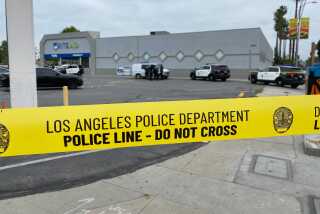PERSPECTIVE ON LAW ENFORCEMENT : Encounters of the Ambiguous Kind : Understanding lethal exchanges in a world where both citizens and police are armed to the teeth and all too human.
- Share via
A gun-toting adolescent encounters a police officer and after the dust settles, a mother is without a son and a community is in an uproar.
A police officer intervenes at the home of a suicidal schoolteacher, and after a brief exchange the officer lies in a pool of his own blood. He dies, leaving behind a widow and an infant son.
Did one officer shoot too soon out of impulsive prejudicial rage? Did the other fall victim to deadly humanistic hesitation? However different the outcomes, these two incidents share a critical common fact pattern: The players made their life-and-death decisions at lightning speed.
Has the paranoia, politics and suspicion that characterizes the relationship between the police and the citizenry escalated to the point that virtually any encounter has the potential for a lethal end? Are these two encounters--one in Lincoln Heights, the other in Simi Valley--atypical rarities that bespeak nothing more than the chance synergy of mental illness, criminality, deadly fire power and the heat of summer? Alternatively, does last week’s multimillion-dollar verdict against Los Angeles County law enforcement officers for excessive force portend a more fundamental problem? Does the willingness of a defendant in a murder case to bet his future on convincing ordinary folk that those who are retained to “protect and serve” are part of a massive conspiracy against him suggest that the very fabric of our social order is fraying?
While mutual suspicions between citizens and police is news, it is not new. Indeed, our forefathers elevated this polemic to a constitutional question when they decided to set forth the boundaries of the relationship between the citizen and the state in the Fourth and Fifth amendments. Acting reasonably and with probable cause, the police may seize, search and enter your home. Without probable cause, even a burning intuition of criminality must surrender to the sanctity of a citizen’s privacy and the right to be left alone. For some in law enforcement, true probable cause is a shackle that selectively binds the righteous. Killers kill without probable cause. Rapists rape without probable cause. But on arrest, killers and rapists become civil rights crusaders and the police are on trial. For some innocent citizens of color, probable cause is an ephemeral promise of privacy that is regularly extinguished by a plethora of official lies told after the arrest to justify police misconduct. One man’s pretext and roust is another man’s lawful justification. It is in this psychological ambiguity that citizen meets cop.
Citizens, even psychopathic citizens, virtually never wake up in the morning and deliberate the assassination of a police officer. Likewise, police officers, even “rogue cops,” do not set out to hunt down and murder adolescent boys. Homicidal conduct between citizens and police is ignited in the moment by the combustible cloud of ambiguity and mutual distrust. Reason gives way to passion under the incredible pressures of deadly threat and a mere second to decide.
In a world where both citizens and police are armed to the teeth, and where humans, not terminator robots, pull the trigger, maybe we should celebrate the relative rarity of mortal meetings between citizens and police. Maybe, sometimes, we should consider forgiveness instead of empty political rhetoric, slogans and recriminations.
More to Read
Sign up for Essential California
The most important California stories and recommendations in your inbox every morning.
You may occasionally receive promotional content from the Los Angeles Times.










